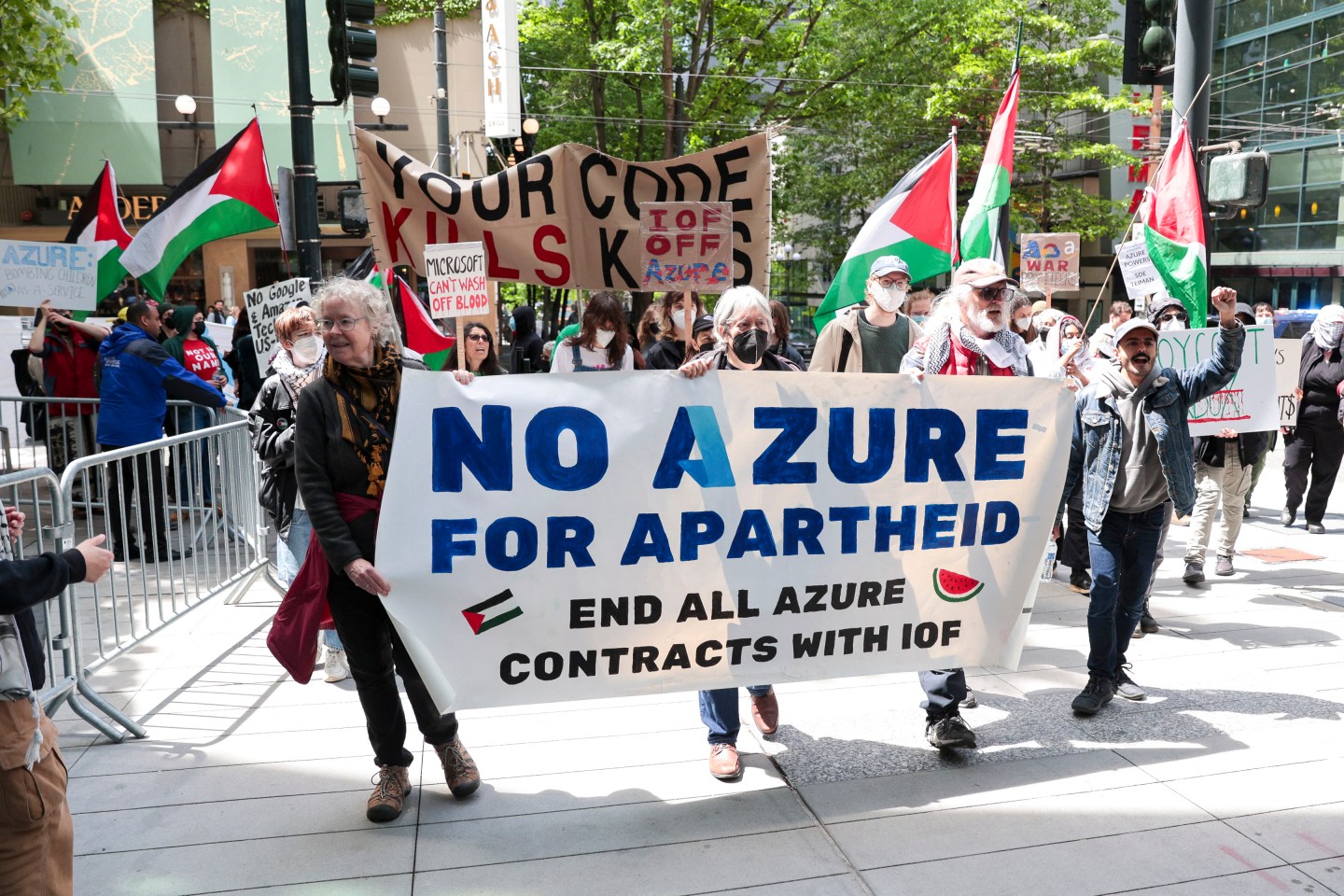Microsoft Under Fire for Allegedly Filtering Internal Emails Containing Terms Like ‘Palestine,’ ‘Gaza,’ and ‘Genocide’
Microsoft Under Fire for Allegedly Filtering Internal Emails Containing Terms Like ‘Palestine,’ ‘Gaza,’ and ‘Genocide’
By
Calder Monroe
Last updated:
May 23, 2025
First Published:
May 23, 2025

Getty Images
Microsoft Employees Report Email Filters Targeting Political Terms
In recent days, a growing number of Microsoft employees have raised serious concerns over the alleged blocking or delayed delivery of internal Outlook emails containing politically sensitive terms such as “Palestine,” “Gaza,” “genocide,” “apartheid,” and “IOF off Azure.” These concerns stem from a noticeable pattern observed around noon Pacific Time on a Wednesday, when workers reported that emails with these words failed to reach recipients, while otherwise identical messages without them went through successfully.
Internal Investigations and Employee Reactions
According to documentation, screenshots, and conversations reviewed by CNBC, this issue has impacted employees across multiple departments—even those attempting to file human resources (HR) complaints. Several employees confirmed they were able to send work-related emails without issue just minutes earlier, but experienced delivery failures once these terms were included—either in the email body or signature.
One employee said, “It feels like being silenced by the very tools we use to communicate. I couldn’t even file a simple HR report without editing out words that reflect my identity and concerns.”
Internal message boards viewed by CNBC showed employees questioning why terms such as “Israel” were permitted, while others—specifically referencing Palestinian territories or the broader humanitarian crisis—seemed restricted. Modifying spellings (e.g., “P4lestine”) reportedly allowed emails to be sent, suggesting content-specific filters.
Microsoft’s Official Response
Frank Shaw, Microsoft’s Chief Communications Officer, publicly responded on an internal thread stating:
“To clarify, emails are not being blocked or censored, unless they are being sent to large numbers of random distribution groups.” He also acknowledged minor delays and noted the technical team was working to reduce them.
A separate spokesperson explained:
“In recent days, we’ve seen large-scale emails being sent to tens of thousands of employees. We’ve implemented measures to reduce mass internal messaging to recipients who haven’t opted in.”
Despite these statements, employees claim even small group emails—containing as few as two recipients—faced delivery failures if specific keywords were present. Delays in automated HR acknowledgment emails also exceeded 24 hours in some cases, and several employees suggested that emails may be undergoing manual review before delivery.
Escalating Tensions and Internal Protests
This controversy coincides with escalating internal tensions at Microsoft related to the Israel-Gaza conflict. Protests at corporate events—including the recent Build developer conference in Seattle—have disrupted keynote sessions and AI panels. Activists, including employees and outside organizers, have publicly criticized Microsoft’s involvement in supplying AI and cloud services via Azure to the Israeli military.
During a security-focused AI session, protester Hossam Nasr—formerly a Microsoft employee terminated in 2023 after organizing a vigil for Palestinians—confronted Sarah Bird, head of Microsoft’s responsible AI division, stating:
“Sarah Bird, you are whitewashing Microsoft’s crimes in Palestine.”
Another unnamed Palestinian employee interrupted CoreAI head Jay Parikh’s presentation, saying, “My people are suffering because of you… Cut ties with Israel.”
Consequences for Protesters
Several protest participants have faced termination. Joe Lopez, a software engineer who interrupted CEO Satya Nadella’s keynote to protest Azure’s connection to Israeli military operations, was terminated for “misconduct resulting in the violation of both company policy and our expectations of a respectful workplace,” according to an internal document reviewed by CNBC. The document states Lopez is now permanently barred from working with Microsoft in any capacity.
Similar fates befell Ibtihal Aboussad and Vaniya Agrawal, two engineers who protested at Microsoft’s 50th anniversary event in April. Both were terminated shortly after their public demonstrations.
Broader Implications: Corporate Neutrality or Suppression?
These incidents have sparked a wider debate about corporate neutrality, censorship, and the ethical responsibility of tech giants like Microsoft. Advocacy group “No Azure for Apartheid” has called for increased transparency in internal communications policies and demands a reevaluation of Microsoft's government and military contracts.
Some legal analysts and digital rights advocates warn that if Microsoft is manually filtering emails or algorithmically suppressing terms tied to a geopolitical crisis, it could raise ethical questions—even if not illegal.
“There’s a thin line between preventing spam and silencing voices,” said Evan Greer, director of Fight for the Future. “Tech companies must ensure their infrastructure doesn’t become a tool for selective censorship.”
Final Thoughts
While Microsoft maintains its stance that it is not blocking individual communication, employees across divisions argue that real barriers remain—especially for those wishing to express solidarity with Palestinians or raise human rights concerns through official channels.
As internal tensions rise and external scrutiny grows, Microsoft may soon need to choose between continuing its corporate silence or addressing the root concerns of its diverse global workforce.
Popular articles
Subscribe to unlock premium content
Amul: The Dairy Revolution That Transformed India’s Economy and Empowered Millions of Farmers

Inside Dettol’s Century of Trust: The Untold Story of How a Disinfectant Became a Global Household Name

Cadbury’s Sweet Empire: The Untold Story Behind Dairy Milk’s Global Success

Amul: The Dairy Revolution That Transformed India’s Economy and Empowered Millions of Farmers

Inside Dettol’s Century of Trust: The Untold Story of How a Disinfectant Became a Global Household Name

Amul: The Dairy Revolution That Transformed India’s Economy and Empowered Millions of Farmers









